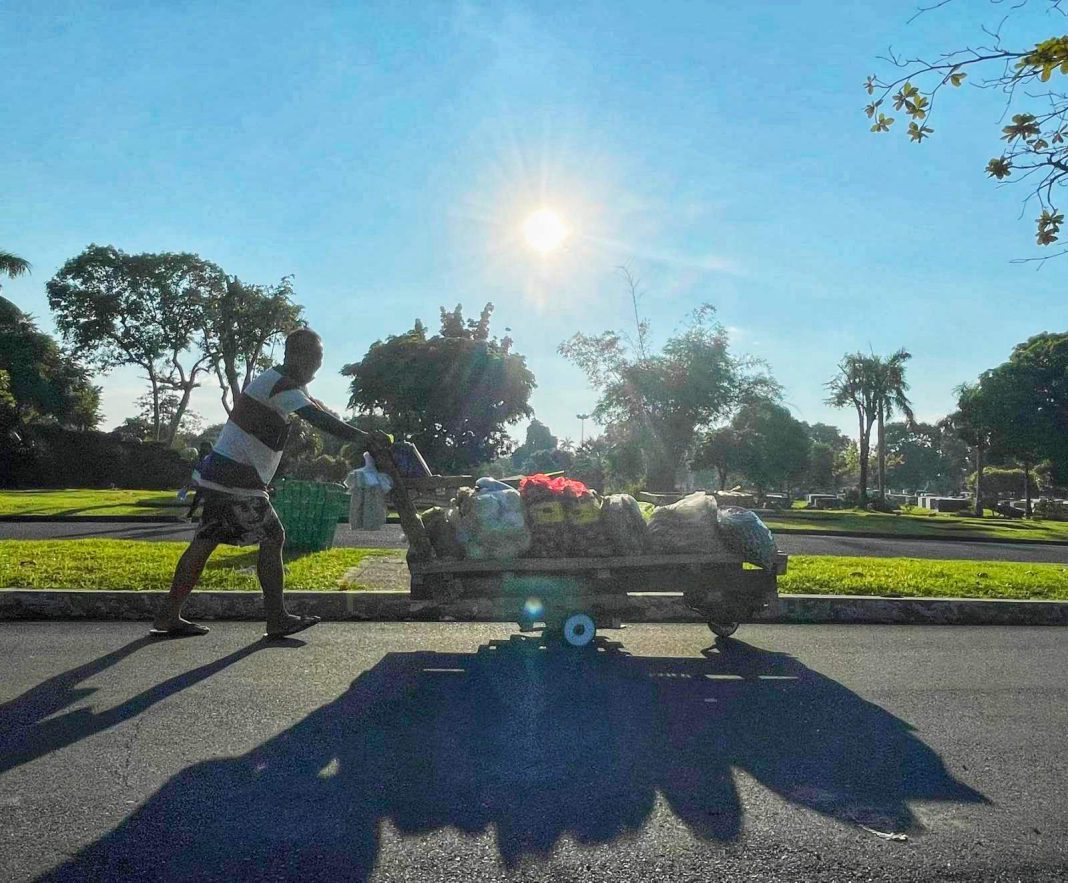A farmer-vendor going around the community in Metro Manila to sell his produce using his cart and admitted to THEPHILBIZNEWS that is challenging for a farmer like him to compete with traders who import vegetables and fruits at cheap prices and dumped in the country. (Photo from THEPHILBIZNEWS/MAS)
By THEPHILBIZNEWS STAFF
When the whole world was caught by the disruptive pandemic that affected the broad spectrum of businesses, one of the realizations that surfaced was there was a threat to food security globally.
It is interesting to note that in the Philippine Statistic Authority data presented last December 2019, the Philippines is now heavily relying on food imports to ensure sufficient supply and stabilize prices. That sad reality still happens now.
Sadly, this is counter to what President Rodrigo Duterte said during one of the GMA Network-sponsored Presidential Debates dubbed as PiliPinas Debates 2016 that when he wins, he will make the Philippines the food basket in the region just like Mindanao.
But with the data from PSA, our Food Balance Sheets (FBS) for 2016-2018 showed that the import dependency ratio (IDR) for food has risen steadily to 29.16 percent in 2018 from 22.67 percent in 2017 and 22.51 percent in 2016, and in the latest report for years 2018-2022 is 24.9% import dependency ratio (IDR) of the country not to mention 2021-2022 which lately takes the headlines of too much dependence of the Philippines from importing fish, rice, pork and other agricultural products.
Given this trend and if it continues, the Philippines is at risk of food shortage not apart from the fact that we have already a problem in the supply chain, the critical part is our self-sufficient production.
Cognizant of the problem in the food security of the country, Dr. Rowena Cristina Guevara, undersecretary for Research and Development of the Department of Science and Technology (DOST) launched Flavors of Science Campaign and revealed the importance of helping our farmers and fisherfolks.
“Science plays a big role in ensuring we have food on our table. Our scientists and researchers are helping our farmers and fishermen how to increase their harvest, as well as their income.”
This is what Dr. Rowena Cristina Guevara, undersecretary for Research and Development of the Department of Science and Technology (DOST), said during the recent launching of Flavors of Science Campaign, which recognizes the contribution especially of farmers, fisherfolk and scientists in ensuring a stable supply of quality food for Filipino consumers and entrepreneurs.
The Flavors of Science campaign is an initiative of the Philippine Council for Agriculture, Aquatic, and Natural Resources Research and Development of the DOST (DOST-PCAARRD) that hopes to communicate to more Filipinos the value of the farmers’ and fisherfolk’s contribution and hard work to ensure quality produce.
It also aims to provide an opportunity for the public to appreciate the science behind the farm and fish products that they consume, most notably the scientists’ involvement to find ways to increase yield through science-based solutions to ward off pests, control diseases, and develop products, among others.
To do this, DOST-PCAARRD collaborated with a renowned chef, restaurant owner, and celebrity, Marvin Agustin, to be its agri-aqua ambassador. Agustin will showcase food recipes out of agriculture and aquatic produce from DOST-PCAARRD’s R&D. He will also feature the people behind the innovations and the places where these developments are happening.
As a chef, Agustin advocates the country’s self-sufficiency in food production, wherein big restaurants will use ingredients that are locally produced, instead of sourcing them abroad.
“Bilang Pinoy, ah, masasabi ko na mas gusto ko sanang gumamit ng mga produce na talagang galing sa Pilipinas. Una sa lahat hindi lang talaga sa mapapatunayan natin na super fresh ito dahil galing sa ating bansa, hindi bumabyahe ng malayo. Ang maganda din dito ay nagkakatulungan ang maraming sector, ang mga farmers, kami as a consumer, tsaka business owner.”
DOST-PCAARRD reached out to Agustin upon learning that he appreciated Markaduke, a native pig often used in lechon (roast pig) which was developed by Marinduque State College through the assistance of DOST-PCAARRD. Agustin, through his extensive social media exposure, as well as his recipe and advocacy, will help inform more people about the science behind Filipino food, especially those that involve local R&D initiatives.
These R&D outputs are part of the Niche Centers in the Regions for R&D (NICER), a program of the DOST that collaborates with higher learning institutions to strengthen their R&D capability through the use of appropriate knowledge and tools. Currently, there are 19 NICERs in the 17 regions nationwide that are focused on food production. The NICER program, which is part of the umbrella program called Science for Change Program (S4CP), aims to improve the country’s R&D.
“We expect that more people especially in our youth will appreciate science and technology, and open their eyes and minds with the science behind every meal served on our dining table,” Guevara concluded in her closing remarks.














